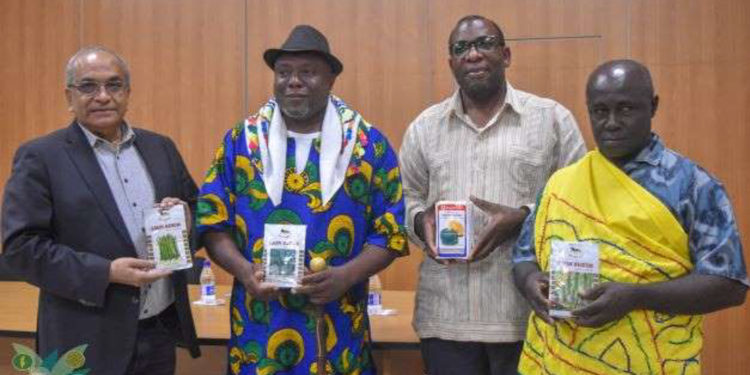Paramaribo, Suriname, 28 June, 2022 (IICA). The Paramount Chief of the Saramacca Maroon, Albert Aboikoni, received on behalf of the Saramacca maroon community, agricultural inputs, seeds, small agricultural equipment and implements to assist with the immediate rehabilitation of farms, considering the devastation caused by recent flooding in the hinterland of Suriname, occasioned by higher-than-normal average daily rainfall in the past three months of this year.
The 2022 rainy season began with a much higher than normal average daily rainfall, and since from the start of April, there have been relatively heavy rains in all South Suriname and in the coastal zone. The Meteorological Office has indicated that flood waters have risen 10 to 14m above normal levels and are still rising in some areas. This has led to significant widespread flooding and especially the breaching of banks of the Suriname River, the Tapanahony and Marowijne rivers, and in the process fully submerging various villages, their agricultural plots, and other surrounding lands. Many maroon villages have reported 100% damage and loss of agricultural production.
As a result of the impact of these floods on the Saramacca maroon communities who number close to seventy-two villages, and who depend almost exclusively on agriculture for their livelihoods, a main priority is to provide emergency assistance to procure, seeds, fertilizers and small tools and implements to immediately begin planting staple crops in higher ground to avoid potential food shortage problems in the coming months.
The Paramount Chief, Albert Aboikoni and members of his governing council, joined the Minister of Agriculture, Permanand Sewdien and his staff, as well as Representatives from other stakeholder entities and the media at the grounds of the Ministry of Agriculture, Animal Husbandry and Fisheries for the Official handover ceremony hosted by the IICA Delegation in Suriname.
The Minister of Agriculture, Parmanand Sewdien in his remarks, thanked IICA for its continued support to the Government and the agricultural community in Suriname. He indicated that, “they (national authorities), who having been frontline witnesses to the frequency of such climatic events in the past two decades, needs to in addition to strengthening agricultural disaster risk management to climate change impacts, there is urgent need to develop more efficient emergency response strategies for events of this nature, and especially to take into account the unique challenges of access posed by remote rural communities such as that of the Saramacca maroons in the hinterland of Suriname.
The IICA Representative in Suriname, Curt Delice, reiterated the fact that IICA’s Director General Dr. Manuel Otero, has called for a refocusing of the approach to agriculture in our hemisphere, and he indicated that “local communities must recognized their changing environment and the impact it is having on their traditional ways of food production, and the need to adopt new ways of practicing their craft, while agricultural policy makers and rural service provider agencies, must see the urgent need to climate proof their policies and strategies to meet the new reality we a facing with climate change, and ensure that we continuously strengthen the resilience of our agriculture sector to the negative impacts that climate change brings.”
Chief Aboikoni in his remarks on accepting the emergency supplies on behalf of his people, expressed his immense gratitude to IICA for speedily coming to their aid in their moment of dire need, and he also thanked IICA for the long-standing collaboration and support to his villages in their agriculture development. He explained that his Council has “in the wake of these floods, but also recent extended drought events which has impacted his villages, recognized the need for more effective organization in the way they do things. He indicated that they had lost many of their rare upland rice varieties to the recent floods and it is a major blow to them as these have been handed down from generation to generation for centuries. They need to begin to change their agriculture to avoid such disasters and they will be needing all the assistance they can get to achieve this goal.”
IICA will be collaborating with the Ministry of Agriculture, Animal Husbandry and Fisheries (LVV) and the Suriname Agrarian Federation (FSA) to support agricultural rehabilitation efforts of the affected communities. The agencies will profit the opportunity to introduce more climate resilient crop production technologies to the beneficiaries, to mitigate a recurrence of such high levels of devastation in the future from similar events.









